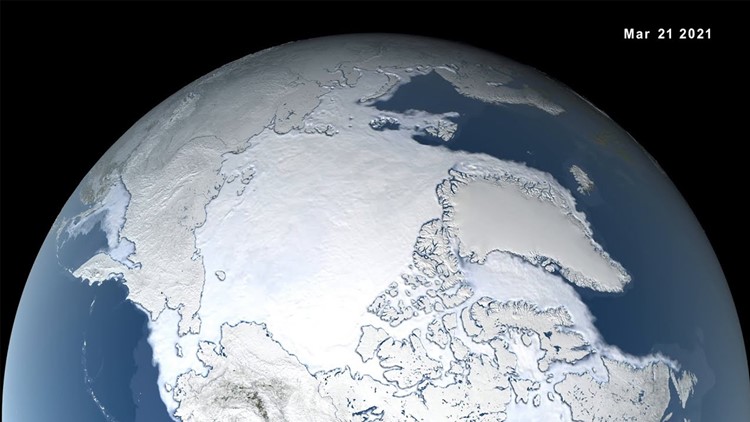Sea ice in the Arctic has hit its annual maximum, and NASA says it was some of the smallest areas of sea ice ever recorded there.
NASA announced today that the 2021 wintertime extent reached on March 21 ties with 2007 as the seventh-smallest extent of winter sea ice in the satellite record, according to scientists at the NASA-supported National Snow and Ice Data Center and NASA.
In the report, it’s noted that this year’s maximum sea ice extent peaked at 5.70 million square miles. That is 340,000 square miles below the average maximum between 1981 and 2010 – equivalent to missing an area of ice larger than the state of Texas and Florida combined.
Sea ice is frozen seawater that floats on the ocean surface. It forms in both the Arctic and the Antarctic in each hemisphere’s winter. During the summer, much of it melts but it doesn’t completely disappear.
This floating ice is very important to the entire planet.
Arctic sea ice keeps the polar regions cool and helps moderate the global climate. Sea ice has a bright white surface. 80 percent of the sunlight that strikes it is reflected back into space. Without it, the Arctic Ocean waters warm, as does the planet.
The thickness of the ice cover is also in decline.
The National Snow & Ice Data Center says scientific measurements show both the thickness and extent of summer sea ice in the Arctic have shown a dramatic decline over the past 30 years. The loss of sea ice also has the potential to accelerate global warming trends and to change climate patterns.
NASA adds that since 1979, satellites have provided a consistent continuous record of sea ice.
Natural variability and rising temperatures linked to global warming appear to have played a role in this decline.
The Arctic may be ice-free in summer before the end of this century, according to NASA.
- Doctors say vaccine passports make sense to limit spread of COVID-19
- 'It moved fast:' UK variant now causing most COVID-19 cases in Florida, doctor says
- Derek Chauvin trial: 4th teen eyewitness testifies about George Floyd's death at Derek Chauvin trial
- Elevated levels of red tide reported in southwest Florida
- Study finds high levels of carcinogen in some hand sanitizer brands
- Church transformed into luxury home up for sale in St. Petersburg
►Breaking news and weather alerts: Get the free 10 Tampa Bay app
►Stay In the Know! Sign up now for the Brightside Blend Newsletter



